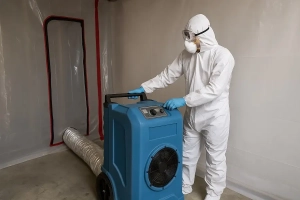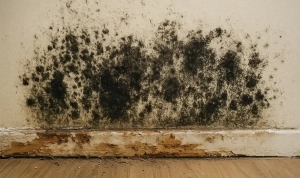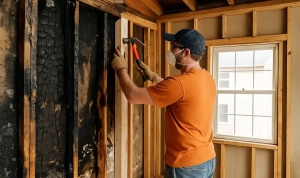Water damage is one of the most stressful emergencies a Portland homeowner can face. A burst pipe, a leaking roof, a failed water heater, or groundwater intrusion can leave a home soaked within minutes. Once water enters a property, it spreads through flooring, drywall, cabinets, insulation, and even electrical components. What begins as a small drip can become a major disaster if not handled immediately.
During an emergency, homeowners often search for help and see different terms that can be confusing. Words like mitigation, remediation, extraction, structural drying, and restoration are frequently used by professionals. These may appear similar, but each one has a specific meaning and covers a different stage of the water damage recovery process.
This in depth guide explains the difference between water mitigation, remediation, and restoration. It also covers how these stages work in Portland’s rainy climate, what homeowners should expect from professionals, and how to avoid long term secondary damage. The goal is to help Portland homeowners make informed decisions when facing a water emergency.
Why Portland Homes Need Proper Water Damage Recovery
Portland’s weather patterns create a unique challenge for homeowners. The city experiences months of consistent rainfall and high humidity. Homes built on slopes or near the Willamette River or Columbia River are exposed to groundwater issues, especially during heavy storms. Older houses in neighborhoods such as Sellwood, Woodstock, Alberta, Hawthorne, and St. Johns often have aging pipes, worn roofs, or crawlspace ventilation problems.
Because moisture is persistent in the region, improper cleanup almost always leads to mold growth. This is why homeowners must understand the full recovery process. Skipping even one step can cause moisture to remain behind walls or under floors, eventually resulting in rot, odors, or mold contamination. A complete recovery requires mitigation, remediation, and restoration.
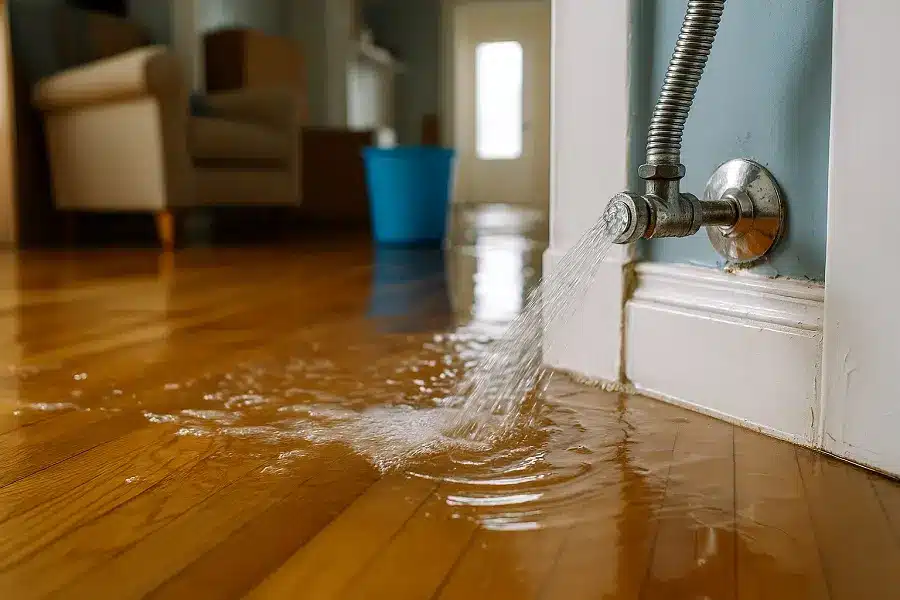
What Is Water Mitigation
Water mitigation is the first stage of the recovery process. This step focuses on stopping the damage from getting worse. It is all about immediate action and preventing further destruction.
Water mitigation typically includes:
- Stopping the water source
- Extracting standing water
- Protecting furniture and belongings
- Setting up early drying equipment
- Removing materials that are too saturated to save
- Preventing water from spreading into other rooms
Mitigation is urgent. When homeowners in Portland notice water damage, the first call they make should be to a water damage professional who can begin mitigation right away. Companies like 911 Restoration can respond fast and prevent what could be thousands of dollars of additional damage.
Why Mitigation Matters
Water spreads fast. For example:
- In the first hour, water begins soaking into flooring and baseboards.
- Within 24 hours, drywall begins to swell and deteriorate.
- Within 48 hours, mold begins forming.
Mitigation reduces how much of the home needs to be repaired or replaced later. It is the action that saves money and protects the structure.
Real Life Example in Portland
A home in Northeast Portland experienced a washing machine supply line burst at night. The homeowners discovered it six hours later. Because mitigation began within the first day, the flooring was saved, and drywall only needed partial repairs. If they had waited two or three days, mold would have spread into the walls, causing much more expensive work.
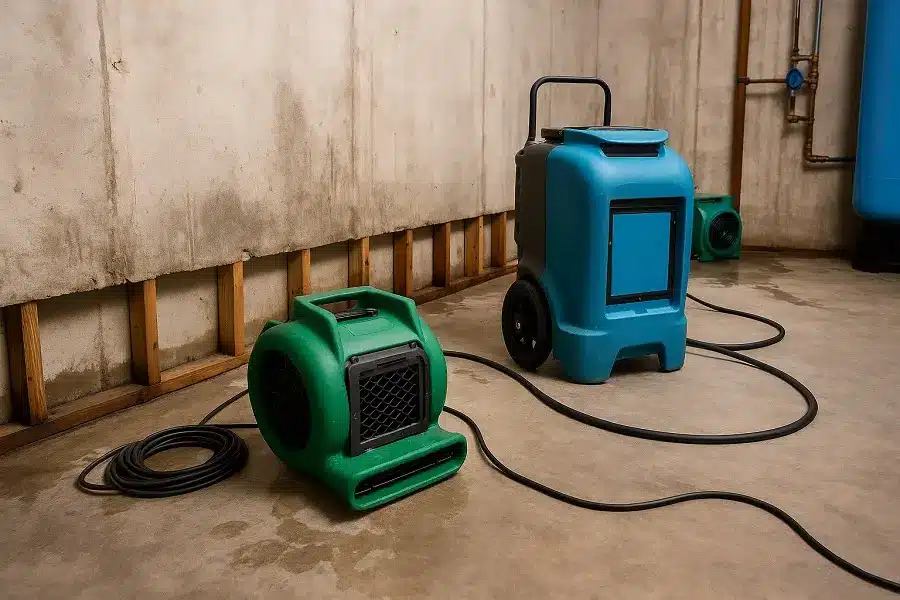
What Is Water Remediation
Water remediation follows mitigation. Remediation focuses on cleaning, disinfecting, and drying the environment completely. Extraction alone is never enough. Materials hold moisture long after the visible water is removed.
Remediation includes:
- Industrial dehumidification
- Air movement and circulation
- Moisture monitoring
- Sanitizing all affected surfaces
- Removing contaminated materials
- Preventing mold growth
Remediation is a scientific process. It requires equipment that most homeowners do not have. This includes high velocity air movers, large commercial dehumidifiers, HEPA filtration devices, and moisture meters that detect water behind walls.
The Importance of Remediation in Portland
Because Portland has high humidity for much of the year, drying takes longer here than in many other parts of the country. Indoor moisture levels must be reduced to safe levels before repairs can begin. If a home is repaired too early, trapped moisture can lead to mold, odors, or structural weakening.
Example of Incomplete Remediation
A family in Gresham cleaned up a small kitchen leak themselves. They dried the floor surface but did not check behind the base cabinets. Mold formed in less than two weeks. When the professionals arrived, the mold had spread through the cabinets and into the wall cavity. Complete remediation would have prevented this outcome.

What Is Water Damage Restoration
Water damage restoration is the final stage. After mitigation stops the damage and remediation dries and sanitizes the home, restoration rebuilds the affected areas.
Restoration may include:
- Replacing drywall
- Installing new flooring
- Repairing cabinetry
- Repainting
- Fixing structural components
- Restoring damaged insulation
- Repairing baseboards, trim, or framing
The goal of restoration is to return the home to pre damage condition or better. Some homeowners use this phase as an opportunity to upgrade materials, install waterproof flooring, or improve ventilation.
A Complete Restoration Example
A home in Hillsboro suffered roof damage during a windstorm that allowed rainwater into the attic. After mitigation and remediation, the restoration phase included replacing insulation, reinstalling drywall, painting, and repairing roof sections. The final result looked brand new.
Companies like 911 Restoration of Portland provide full service restoration, meaning homeowners do not need to hire multiple contractors. This keeps costs lower and speeds up the timeline.
Frequently Asked Questions About Water Damage Recovery
How long does the entire process take?
Minor damage may take three to five days. Major flooding may take two to four weeks because of drying and reconstruction.
Does insurance cover water mitigation and restoration?
Most insurance policies cover sudden and accidental water damage. They usually exclude long term leaks and lack of maintenance.
Can homeowners do mitigation themselves?
Sucking up minor spills is fine, but major losses require commercial extraction equipment. Household fans and shop vacuums cannot dry a structure fully.
What happens if water remains trapped in walls?
Trapped moisture leads to mold growth, warping, rot, or electrical hazards. This is why moisture inspection is essential.
Is mold guaranteed after water damage?
No. Mold grows when moisture remains for more than 24 to 48 hours. Fast and complete remediation prevents mold growth.
Signs That Water Damage Was Not Repaired Correctly
Homeowners should be watchful for the following signs after repairs:
- Musty or earthy odors
- Warped flooring or walls
- Discoloration returning on drywall
- Cold, damp areas that never dry
- High indoor humidity
- Recurring mold
These signs indicate incomplete remediation. Calling a professional quickly can prevent further damage.
Preventing Water Damage in Portland Homes
Homeowners can reduce future water damage risks with consistent maintenance:
- Clean gutters several times per year.
- Inspect roofs for missing shingles or weak spots.
- Install a sump pump in basements if needed.
- Insulate pipes during winter.
- Improve ventilation in crawlspaces and attics.
- Check under sinks for slow leaks.
- Use humidity monitors indoors.
Portland’s environment makes prevention especially important.
Conclusion
Understanding water mitigation, remediation, and restoration helps Portland homeowners make informed decisions under stressful circumstances. Each stage has a different role, but all are necessary for complete recovery. With fast mitigation, thorough remediation, and professional restoration, homeowners can protect their investments and return to a fully safe living environment.

